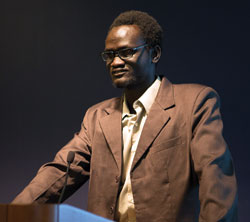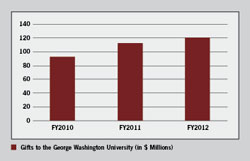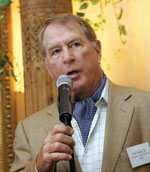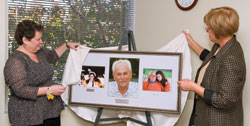Banaa Scholars Building Toward a New Sudan
GW student organization brings together Sudanese scholars at first annual summit.
In his four years at GW as the university's first Banaa scholar, Makwei Deng, BA '12, wrote and published a textbook in his native language, interned at the World Bank and the U.S. Holocaust Memorial Museum, and had a major impact on his classmates and professors.

Makwei Deng, BA '12, the first Banaa Scholar, tells the story of his childhood as a refugee at the First Annual Banaa Scholars Summit.
This fall, Mr. Deng is returning to his home—now the Republic of South Sudan—where he grew up before fleeing to a refugee camp in Kenya. What he learned at GW studying philosophy and economics will help him bring change to his struggling country, which is exactly what a group of GW students set out to achieve when they founded the scholarship in 2007.
As a response to the war and genocide in Sudan, a group of GW students started Banaa to educate students from the most marginalized regions of Sudan and supply them with leadership and peace-building skills that they could use back home. To aid that goal, student volunteers organized the First Annual Banaa Scholars Summit at GW that brought together Mr. Deng and the two other Banaa scholars.
From Aug. 6 to Aug. 15, the Banaa Scholars met with government and NGO leaders, engaged in peace-building seminars, and honed their storytelling and professional skills through workshops and seminars.
"This was a valuable opportunity for them to build connections with each other, Banaa student leaders, and professionals in our nation's capital," says Brian Browne, a junior and member of Banaa's student staff.
The three Banaa scholars also visited the U.S. Holocaust Memorial Museum, the U.S. State Department, the Embassies of the Republic of Sudan and the Republic of South Sudan, and the United States Institute for Peace.
"Banaa Scholars bring a unique and untold perspective to bear on college campuses and in the community," Mr. Browne says. "Above all, we are happy to have Makwei as a great friend, whose experiences brought us a rare glimpse into a culture and a society that we otherwise never would have been exposed to."
Visit Banaa.org to learn more, or to make a gift today. For information on how you can support Banaa and its scholars, please contact Matt Banks at mbanks@gwu.edu or 202-994-5125.
 Giving Reaches New Heights in 2012
Giving Reaches New Heights in 2012
More than 22,000 members of the GW community gave back to the university last year, helping to set a record year. Gifts and grants to GW totaled more than $120 million in fiscal year 2012, exceeding the year's goal.
Giving increased for the second year in a row and grew by 6 percent from fiscal year 2011 to 2012. In addition to the rise in giving totals, the number of gifts and pledges to GW increased this fiscal year as well.
Highlights of 2012 include 100 percent participation by university leadership and the Board of Trustees, $14.8 million in support of the GW Power & Promise Fund for student aid, and a partnership with The Textile Museum.
Focusing on the Facts
Philanthropist partners with SMPA to create nonpartisan media initiative.

Philanthropist Edward Scott Jr. made a $1.5 million gift to the George Washington University School of Media and Public Affairs to launch Face the Facts USA.
Between all of the sound bites and spin, it can be difficult to sort through the political rhetoric to find the facts behind the most important issues facing the country.
To address this challenge, philanthropist Edward Scott Jr. made a $1.5 million gift to the George Washington University School of Media and Public Affairs to launch a project called Face the Facts USA.
"The issues that really matter in our society are not black or white; they are mostly gray," Mr. Scott says. "Allowing the American public to become lackadaisical and disinvested with the way we think about our country's most pressing issues would be a dangerous mistake."
A multiplatform, nonpartisan initiative from the GW Center for Innovative Media at SMPA, Face the Facts USA presented a new fact each day leading up to the election (see sidebar, page 20). The project was meant to re-engage Americans in the political process, using the facts behind the major challenges facing our country as the basis for civil conversation. Frank Sesno, director of SMPA and former CNN Washington bureau chief, leads the project.
"Ed Scott sees the need for the country to have more and better information, appreciates the impact creative new media can have, and is confident GW can help fill that role," Mr. Sesno says. "Working with Ed has been a delight. He has become a great friend of SMPA and the university."
 Mr. Scott spent 17 years in the U.S. government, which included service under seven attorneys general (Republicans and Democrats) and three secretaries of transportation. After leaving the U.S. government, Mr. Scott became involved in software development and founded BEA Systems Inc., one of the largest software companies in the country.
Mr. Scott spent 17 years in the U.S. government, which included service under seven attorneys general (Republicans and Democrats) and three secretaries of transportation. After leaving the U.S. government, Mr. Scott became involved in software development and founded BEA Systems Inc., one of the largest software companies in the country.
"GW is the perfect place for an initiative like Face the Facts," Mr. Scott says. "The university is quite well known as a setting for interesting and complex political discourse, and having someone like Frank Sesno drive the initiative is a tremendous resource."
Although it is characterized as an election-year initiative, Mr. Scott says he hopes that funding will allow for Face the Facts USA to continue past the election.
"The idea behind Face the Facts is to force people to get into the habit of understanding the facts and getting involved in public debate," he says. "The importance of that won't change after November."
To learn more and sign up for your daily fact, visit facethefactsusa.org.
A Legacy of Learning
GW parent honors father with gift to School of Nursing library.

Robin Shulman and School of Nursing Dean Jean Johnson unveil a photo memorial featuring Ms. Shulman's graduation from nursing school, her father, Bert Kaplan, and her daughter, Sarah Shulman, BA '12.
A story announcing the creation of the George Washington University's School of Nursing prompted GW parent Robin Shulman, a nurse practitioner, to make the first gift to the school.
"As a nurse, I was very excited to read that GW was establishing its own school of nursing," says Ms. Shulman, whose daughter Sarah graduated from the Columbian College of Arts and Sciences in 2012. "My father had just passed away and I wanted to find a way to honor his memory. Then I read about the new school of nursing in GW Magazine. The timing just seemed right."
Ms. Shulman's father, Bert Kaplan, did not have the resources to go to college, but it was important to him that his children had the opportunity. He worked hard for them to go to college and strived to give back in a meaningful way when he was able, something his daughter always admired. To honor her father's memory and his spirit of philanthropy, Ms. Shulman made a pledge to establish the Elbert A. Kaplan Library Fund.
"Education was always very important to him, and I think providing future nursing students with the resources to work hard and get the most out of their education is something that he would have loved," Ms. Shulman says.
The Elbert A. Kaplan Library Fund provides books and other learning resources for the School of Nursing.
"This special fund enables us to create breadth, depth, and diversity in the library nursing resources," School of Nursing Dean Jean Johnson says. "This is crucial for high-quality learning and preparing nursing students for the real and wide range of challenges they will face in their nursing profession."
The nursing school also received its first planned gift this year, an endowed scholarship and endowment for the dean's discretionary fund from Annetta Weiss, BA '65. (See story in summer 2012 GW Magazine.)


 Giving Reaches New Heights in 2012
Giving Reaches New Heights in 2012
 Mr. Scott spent 17 years in the U.S. government, which included service under seven attorneys general (Republicans and Democrats) and three secretaries of transportation. After leaving the U.S. government, Mr. Scott became involved in software development and founded BEA Systems Inc., one of the largest software companies in the country.
Mr. Scott spent 17 years in the U.S. government, which included service under seven attorneys general (Republicans and Democrats) and three secretaries of transportation. After leaving the U.S. government, Mr. Scott became involved in software development and founded BEA Systems Inc., one of the largest software companies in the country. 